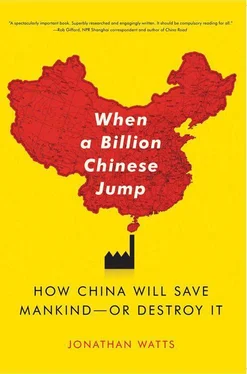There was some truth in this heartwarming idea that the one-party state was joining hands with an emboldened media to rein in the excesses of polluters and corrupt local governments. Nationwide, journalists have more power than in the past to expose environmental wrongdoing, 23and green NGOs are helping to carve out a bigger space for civil society. 24But there are limits.
As local journalists covering the Songhua spill discovered, the drawbridge was quickly raised when stories threatened stability. Local government ignored the state’s disclosure laws on pollution. 25Editors were given daily lists of topics that they were prohibited from covering. Journalists were under pressure to self-censor and to put the party before the people. Propaganda departments insisted on positive stories. 26
China’s first national park ought to have been one of them. The bus journey from Harbin to the Tangwang River, a tributary of the Songhua, was six hours due north on darkening, frozen roads lined by snow-covered fields and plantations of young, thin trees in tidy rows. Replanted and patterned in this way, the Great Northern Wilderness looked neither very great nor very wild. The vastness has been conquered. The era of the ideological pioneers lives on in the names of local towns: Red Star, East Wind, and Oppose Revisionism Battalion. But nobody in the bus seemed interested in history. Those eyes that were still open were focused on the bus videos: Die Hard, with Bruce Willis, and Forbidden Kingdom, with Jackie Chan and Jet Li.
We arrived in the national park late at night. After stepping off the bus, the first vehicle we saw was a logging truck stacked high with felled trunks. “Isn’t that illegal?” asked my assistant. It certainly seemed ominous in an area where the forests were supposed to be protected.
The bus driver kindly took us an extra few hundred meters to the entrance of our hotel, so we were not outside long in the cold. Closer to Siberia now, the temperature had fallen to minus 35°C. Icicles formed on my beard. Even inside three pairs of socks, my toes became numb walking the short distance from the bus to the lobby. The receptionist apologized that there would be no hot water until the following day. Never mind. I checked in and crashed out, grateful for the warm bed.
Conservation and tyranny can make happy bedfellows. Although the concept of national parks and other protected areas is usually considered both modern and Western, the northeast of China remained untouched for centuries thanks to autocratic fiat that effectively made this region one of the world’s first and biggest nature reserves. In 1668, at the start of the Qing dynasty, Emperor Kang Xi issued a proclamation that anyone who logged, mined, hunted, or fished in the area would be decapitated. 27The Manchu ruler was motivated by a desire to protect the feng shui of his homeland. 28Kang Xi ruled during a period of rampant deforestation and land clearance elsewhere in China, but he left Manchuria in pristine condition. It became a sanctuary for tigers, bears, leopards, wolves, wild boar, and cranes. In the eighteenth century, only a million people lived in what now comprises the three northeast provinces of Heilongjiang, Jilin, and Liaoning, a vast expanse of land covering an area the size of France and the UK combined. 29Harbin, now the biggest metropolis in the northeast, was then a small village. As late as the nineteenth century, when forest still covered 70 percent of the land, the dense woodlands were recognized as the ultimate defense for the nation’s northern borders by one military inspector: “The provinces of Jilin and Heilongjiang are full of primeval forests … Local tribes are either nomads or hunters and they seldom cut trees. The forests there extend several hundred miles without roads and therefore provide better defense than the Great Wall.” 30
Political change led to the tearing down of this natural barrier and, with it, a steady erosion of the de facto wildlife reserve. When the Qing dynasty weakened in the late nineteenth century, the wilderness was opened up and then carved up by colonial powers. In 1896, during a period when Russian influence was strongest, swathes of trees were destroyed for the construction of the Trans-Siberian railway. After Japan became the dominant regional power, the forest clearance was accelerated to provide fuel and building materials for military campaigns in the 1930s and 1940s. 31By the time the Chinese Communist Party took over in 1949, the northeast’s population had soared to 38 million and Heilongjiang’s forest cover had slumped to 45 percent. 32The worst was yet to come.
The Mao era saw the decimation of what was left of the Great Northern Wilderness. As early as 1956, East German experts were warning China against unsustainable clear-cutting (the complete eradication of all trees in a given area) in Heilongjiang, but they were ignored because Mao was in a hurry to catch up with the economies of the West. 33As we have seen repeatedly in this book, the greatest damage was done during the Great Leap Forward. In those few years, entire forests of 400-to 500-year-old Korean pines, camphor pines, and Northeast China ash were felled.
The loggers of Heilongjiang became propaganda heroes for supplying half of the nation’s timber. Their deeds were lyricized in the “Song of the Lumberjacks”:
I’m an ambitious young man from the Tiger Valley
Carrying an axe in my hand,
Chopping down trees on high mountains,
Giving my precious years to the state.
I’m an educated young man from the Tiger Valley,
A full-time lumberjack in my hilly town,
Trained with the best logging techniques,
This happy life will last 10,000 years. 34
That “happy life” lasted barely twenty years. In 1984, clear-cutting was banned. By then it was too late. 35Less than 5 percent of the primary woodland was left. 36
In 1998, deforestation was blamed for a series of devastating landslides across the nation. Visiting Heilongjiang that year, Premier Zhu Rongji declared, “We must never again cut down so many trees.” Logging restrictions were tightened. The state belatedly put its weight behind forest conservation.
In a one-party system, there are no alternative governments and only very weak checks on power. Unable to “kick the bums out,” the best and often only hope for reform is that power wielders die or turn over a new leaf. The Heilongjiang provincial forestry department is trying to do the latter. Formerly loggers, they are now trying to reinvent themselves as conservationists by leading the world’s most ambitious tree-planting campaign. 37On paper, this is an impressive example of poacher turning gamekeeper. In 1978, the government in Beijing announced the start of a seventy-three-year plan to rebuild the forests of northern China by planting a “Great Green Wall” that would stretch 4,480 kilometers from western Xinjiang to eastern Heilongjiang, creating the biggest man-made carbon sponge on the planet. 38
The program was based around a mass mobilization of the sort that only China can muster. The National People’s Congress passed a resolution obliging every healthy Chinese citizen older than eleven to plant three to five trees each year without pay. 39In 1979, March 12 was declared National Tree-Planting Day. 40Every year since then, forestry officials nationwide have taken up shovels on that date, together with an estimated three million party members, civil servants, model workers, celebrities, and state leaders to plant saplings. The air force has also helped with aerial seeding missions.
This was tree-hugging communism at its most vivid and energetic. Watch the domestic propaganda on such days and you would think China must have the planet’s densest forests. 41That ought to be good news, but the propaganda chief of the forestry department appeared reluctant to share it with the outside world.
Читать дальше










